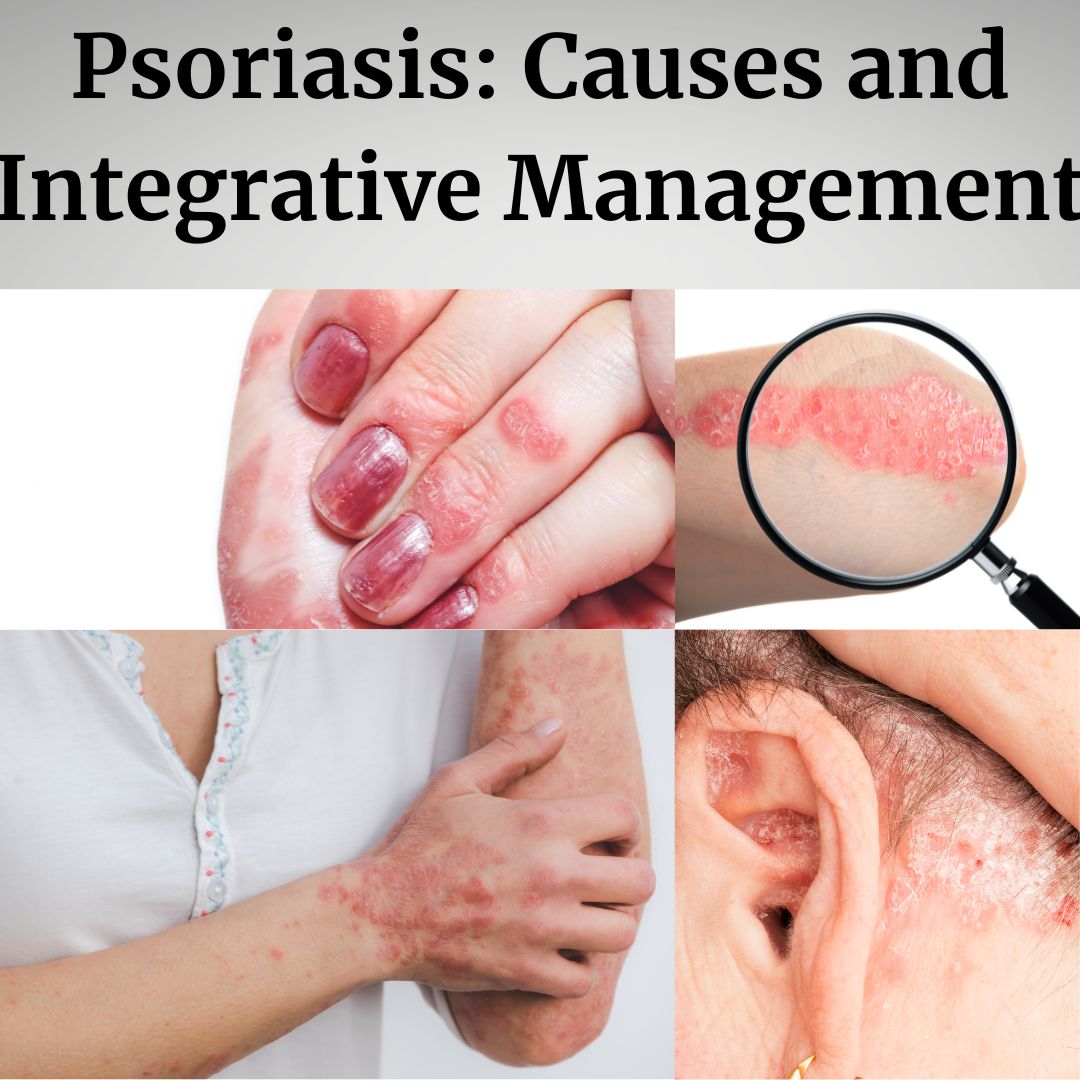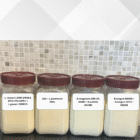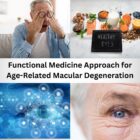Psoriasis: Causes and Integrative Management
Psoriasis is a common immune-mediated skin condition which results in inflammation, rashes and plaques on the skin. This affects 3% and more of the population worldwide. The condition is chronic but an integrative approach with dietary controls, supplements, herbals and stress management can help to achieve the most favourable outcome. In this blog, we discuss the various effective approaches that has significant evidence of efficacy.
What is Psoriasis?
Psoriasis is a chronic skin disease related to problems in the immune system. The patients suffering from psoriasis develop scaly and itchy rashes on their skin usually on their elbows, scalp and knees. Psoriasis is the result of overactive or abnormal T helper cells. Cytokines produced during this process include type I and II interferons, TNFα, IL-6, and IL-1β. Activation of myeloid dendritic cells produces IL-12/23 leading to further T-cell differentiation with the production of IL-17 family of cytokines. Inflammatory mediators and cross-talk between the innate and adaptive immune systems drive keratinocyte activation and proliferation. A pro-inflammatory feedback loop is generated with Th17 production of IL17A. Breaking of the positive feedback loop is a main purpose of anti-inflammatory therapies in psoriasis. While there are other causes leading to psoriasis, the treatment involves integrative therapies, diet therapy and other supplements which we will discuss in detail in this blog. But let us first look at the various causes of psoriasis.
Causes of Psoriasis
It is difficult to rule out a single primary cause leading to psoriasis in individuals. Psoriasis is generally considered a response to issues related to the immune system. But there are different factors affecting the occurrence of this condition in different individuals. Some of the common causes of psoriasis are:
- Abnormal activity of T helper cells
- Thyroid suboptimal functions/Hypothyroidism/Hashimoto’s thyroiditis
- GUT Dysbiosis- pathogenic bacteria over growth, yeast overgrowth, a parasite. One of the major drivers for dysbiosis is antibiotic use, especially multiple extended courses over time.
- Nutrient deficiencies that impair the immune system or detoxification (e.g. vitamin D, zinc, vitamin C, iodine, vitamin A, folate (B9), B12). These might be driven by insufficient nutrient intake, impaired gastrointestinal digestion and/or absorption.
- Stress which can be chronic or short-term acute can trigger immune system over-activation and is usually involved on some level in autoimmune activation. This stress might be emotional or physiological or building because of poor sleep.
- Genetics may also be involved, though these are often related to the above items (e.g. impaired detoxification or low Vitamin D receptor activity or MTHFR gene mutation)
- Diet or food sensitivities such as gluten, dairy, lot of consumption of processed and packaged foods, fruit juices, refined flours, refined oils etc.
Integrative Approach to manage Psoriasis
Skin Care
A good skincare routine helps keep conditions like psoriasis under control. Bathing with gentle body cleansers aids in minimising the trauma to the skin. It also helps in preventing the formation of new psoriasis lesions on the skin. Moreover, avoiding warm showers and baths along with using mild cleansers with no harsh chemicals is an ideal solution to prevent the formation of psoriasis lesions.
Ultraviolet Radiation
Phototherapy is another integrative approach to help treat psoriasis. Research has shown that psoriasis is a condition that tends to improve during the warm months or summer. The intensity of Ultraviolet Rays during these months helps in improving the conditions. Thus, UV therapy is an effective solution to control the formation of psoriasis lesions on the skin. Furthermore, exposure to Ultraviolet Radiation in a medically controlled environment gives better results in improving psoriasis on the skin.
Climatotherapy
Climate and environmental factors play a vital role in the occurrence of psoriasis. Climatotherapy is thus an effective integrative approach to treating psoriasis. In this therapy, the patient suffering from psoriasis must move to a more favourable climatic region where treatment is more effective.
Balneo Phototherapy
Combining water and sun to treat psoriasis is another fruitful approach. For instance, a spa treatment with exposure to water and sun simultaneously improves psoriasis in maximum cases. An elevation of 400 m below sea level tends to alter the atmosphere in a way that is favourable to treating psoriasis. The alteration to the atmosphere increases the thickness of the atmosphere and allows better exposure to UltraViolet radiation to the patient’s skin. Balneo phototherapy combines phototherapy and climatotherapy to treat psoriasis.
Nutrition and Diet Therapy to Treat Psoriasis
Diet and proper nutrition play a key role in treating psoriasis. To treat psoriasis, a patient needs to follow a strict diet and avoid foods that could lead to worsening the condition.
Anti Inflammatory Diet
Psoriasis causes inflammation and thus it is an inflammatory disease. Switching to an anti-inflammatory diet can help manage and control a lot of symptoms and harmful results of an inflammatory condition like psoriasis. Inflammatory foods like red meat, fish, dairy products, alcohol, processed food and condiments must be avoided. Following a Mediterranean-style anti-inflammatory diet helps control and treat psoriasis. Here are some food items one must include in an anti-inflammatory diet to treat psoriasis.
- Spinach
- Avocado
- Cherries
- Lemon
- Blackberries
- Olive oil
- Broccoli
- Red Cabbage
- Red Onion
- Chickpeas
- Cauliflower
- Chives Parsley
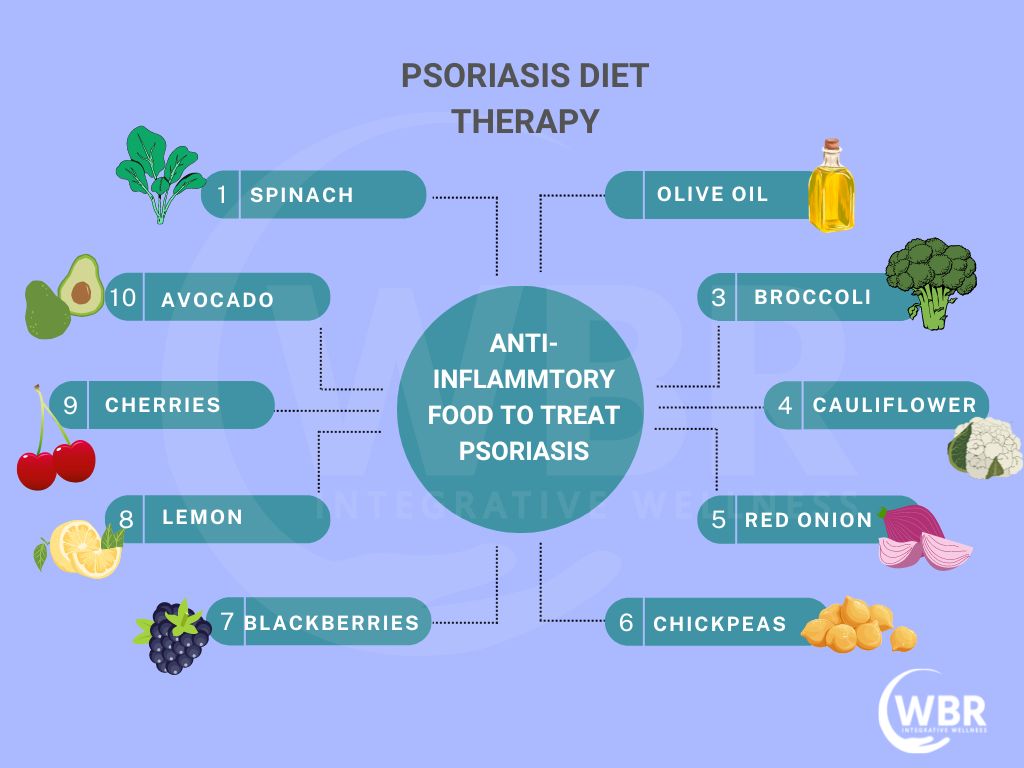
Elimination Diet
Patients suffering from psoriasis show the markers for celiac disease and other related conditions like Gastrointestinal infections. Gluten is a major cause leading to psoriasis. Patients suffering from celiac disease, gastrointestinal issues and psoriasis have gluten intolerance. Therefore, following a gluten-free diet can help improve the overall signs and symptoms related to psoriasis.
Supplement Guidelines to Treat Psoriasis
Supplements with beneficial nutrients are a good fit to treat psoriasis. A range of supplements to treat psoriasis show better results and improved results.
Omega-3
Omega-3 fatty acids of high EPA and DHA (total of 3600 mg per day and above inhibit inflammatory cytokines and also decrease the level of leukotrienes. This can be chosen either of good grade fish oil supplements or from micro-algae sources.
Betaine-HCL
If having low stomach acid because of H.pylori or any other reason, adding betaine HCL as per need can helps in protein digestion and decrease in flare-ups.
Vitamins B, D, C and E
Vitamin D plays an important role in treating skin conditions like psoriasis. A daily dosage of 5000-10000 IU which is oil based gel caps for few months are highly beneficial in eradicating psoriasis.
Vitamin B complex as per serving size which is necessary for cellular functions, repair and healing of skin tissue, supports adrenal and helps in relieving stress.
Vitamin C usually buffered form or liposomal of dose 2000 to 3000 mg daily for few weeks split into 2-3 dose can enhance immune system and support formation of skin tissue and collagen.
Vitamin E neutralises free radicals that damage the skin, D-alpha-tocopherol emulsion based form are better for easy assimilation.
Zinc
Zinc is a vital nutrient for healthy immune function and skin. Furthermore, it has anti-inflammatory effects. Psoriasis leads to a decrease in zinc levels. Thus, zinc supplements are crucial to help treat psoriasis.
Dosage: 30-50 mg/per day
Kelp
Iodine good sources of low dose of 150 to 300 mcg is needed to support thyroid. Thyroid antibodies to be checked before starting any iodine supplements.
SPMs
Specialised Pro resolving mediators, also called SPMs, represent a part of the Omega 3 fatty acid (EPA and DHA) spectrum. It helps the body shut down the immune response, inhibits additional inflammation, clears any damaging by-products of the inflammation, and aids tissue remodelling.
Probiotic and Prebiotics
Probiotics with species L. paracasei L. pentosus, L. rhamnosus GG, L. paracasei, S.boulardii and B. infantis are highly effective in reducing flareup and clearing skin. Complementing with prebiotics fiber such as inulin, FOS, acacia senegal, pectins can accelerate healing.
Note: Consult your doctor before taking any supplements to treat psoriasis
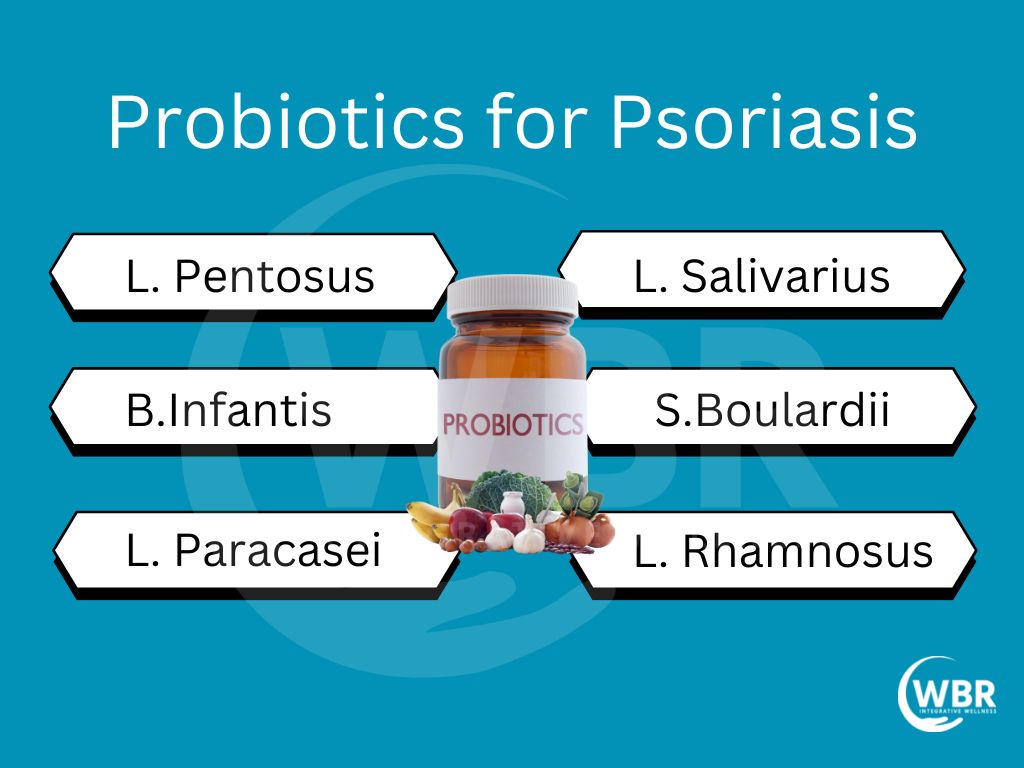
Topical Botanicals to Treat Psoriasis
Many topical botanicals treat psoriasis.
Capsaicin: It is an extract from chilli peppers and it helps in decreasing the levels of substance P which is usually elevated in psoriatic patients.
Dosage: Apply 0.025-0.075%
Aloe Vera: Aloe Vera contains anti-inflammatory compounds. The topical application of aloe vera extract tends to provide anti-inflammatory, anti-itching and pain-relieving effects on psoriatic skin.
Glycyrrhetinic Acid(Liquorice): 11beta hydroxysteroid dehydrogenase enzyme found in liquorice is another necessary topical treatment for psoriasis.
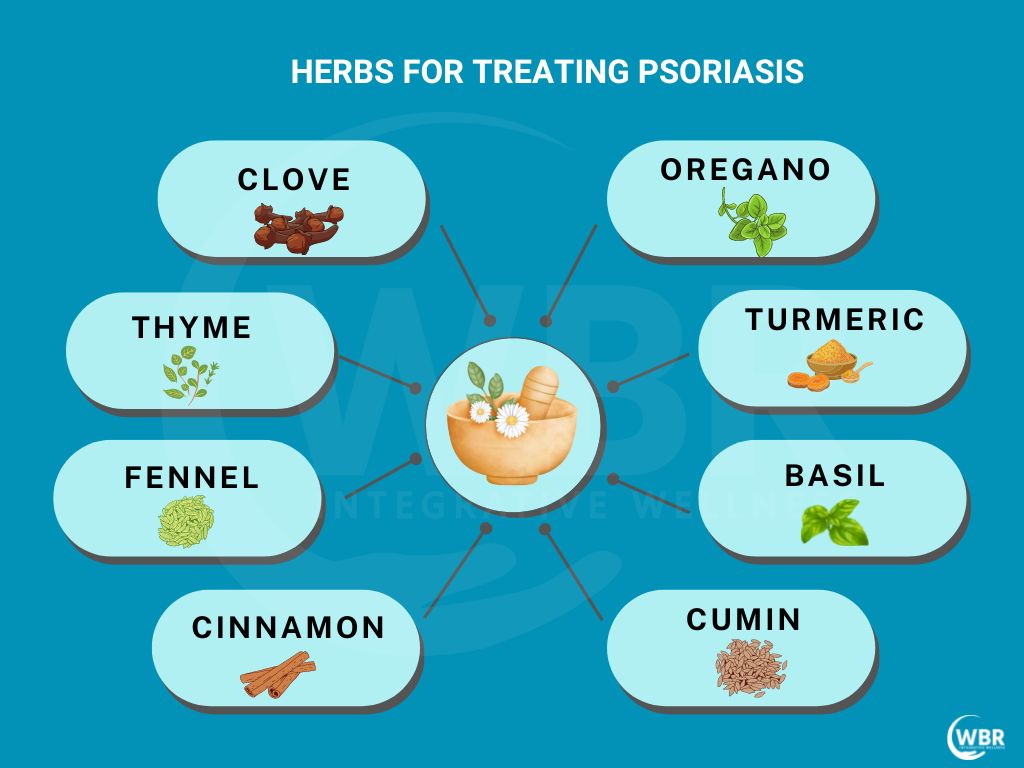
Mind Body Therapy to treat Psoriasis
Meditation
Psoriasis patients suffer from high levels of stress. Furthermore, stress leads to worsening the condition. Thus, it is essential to manage stress levels as it helps in improving psoriasis and its related symptoms. Regular meditation is one way to manage stress levels.
Hypnosis
Highly hypnotizable patients can undergo hypnosis therapy to see a positive change in their psoriasis lesions. Hypnosis treatment is one of the most effective mind-body therapies to treat psoriasis.
Other Treatments
Acupuncture
Acupuncture is a traditional Chinese therapy that uses pressure on acupuncture points to treat various diseases and aches. For psoriasis, the focus must be on points for correcting blood heat(BLB1, BL23, BL12, and BL15) and also wind-dryness resulting from blood deficiency(BL17, BL19, BL12, BL13)
Homoeopathy
Customised homoeopathy therapy is the answer to treat psoriasis in individual patients. Every patient has a different imbalance and thus, a customised homoeopathy treatment can help treat psoriasis with a unique approach.
FAQs
- Essential oil such as geranium, myrrh, tea tree, lavender and frankincense are helpful when applied tropically. This to be mixed in shea butter or any carrier oil such as coconut or almond oil.
- Psoriasis can increase skin energy and Thiamin (Vit B1) is critical for energy production. Supplementing with benfotiamine is beneficial.
- Psoriasis is usually active on dry skin parts like the elbows, torso and knees where the skin has higher chances of becoming red and scaly.
- Skin infections like psoriasis are often related with excessive stress. High stress level can lead to the development of skin infections like psoriasis.
- Psoriasis is often related to low HDL-cholesterol levels, increased levels of atherogenic lipoproteins and accelerated atherosclerosis.
- Mindfulness meditation leads to reduced stress and this can also help in treating skin conditions like psoriasis.
- Psoriasis disease severity directly associates with not just pro-atherosclerotic biomarkers such as IL-6 and CRP, but also endothelial and vascular inflammation.
-
Meta-analyses support an approximate 50% increased risk of CVD in patients with psoriasis.
Conclusion
Psoriasis is a chronic skin condition related to problems in the immune system. But there are multiple treatments available to decrease the symptoms and issues caused due to psoriasis. From using acupuncture to consuming effective supplements, psoriatic patients can choose from a range of effective treatments.

